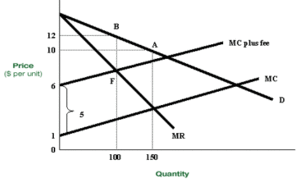Monopoly Price and Output with a Pollution Charge
Overview
Over the last several decades, environmental issues have become an integral part of corporate decision making. Concern for the environment has led to legislation and regulation that have significantly increased the cost of doing business. These, in turn, have spawned expensive litigation over compliance, corrective action costs, and natural resource damages. Economic analysis can help companies respond to legal and regulatory challenges in a way that minimizes these costs.
Legislation and Regulation
As the costs of environmental compliance and remediation become more apparent, some policy-makers are questioning the effectiveness of environmental requirements. Calls for regulatory reform and a greater reliance on markets to achieve environmental goals are based on basic economic principles. Secretariat Economists professionals have published articles on the costs and benefits of regulation and the need for regulatory reform. The economists at Secretariat Economists have also developed comments for clients on the economic impacts of regulatory and legislative proposals.
Litigation
Economic analysis plays an important role in environmental litigation. The valuation of damages associated with environmental accidents is primarily an economic exercise. Secretariat Economists professionals have combined state-of-the-art techniques and their own analytical insights to estimate claims of health, property, and business damages as well as damages to public natural resources. Economic analysis is also an important component of determining penalties for delayed compliance with environmental regulations. The economists at Secretariat Economists have helped private clients negotiate reduced civil penalties based on estimates of their economic gain from delayed compliance. Secretariat Economists professionals have also applied economic analysis and provided testimony in other proceedings related to CERCLA cost allocation and corrective action cases.
Implementation
Economic principles can support the effective implementation of environmental objectives. Evaluation of the costs and benefits of alternative pollution control strategies and projections of the economic consequences of alternative actions can aid in setting environmental priorities. Optimal use of emissions trading and other market incentives can also help to manage future risks and maximize the effectiveness of corporate environmental strategies. Secretariat Economists professionals have performed analyses for clients and published articles on the appropriate techniques for projecting the future costs and benefits of environmental actions as well as on emerging tools for assessing and controlling the financial risks of environmental management.
